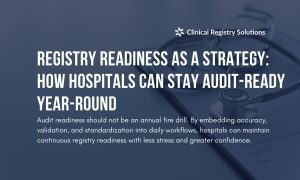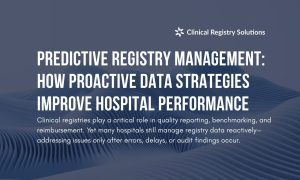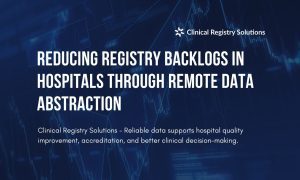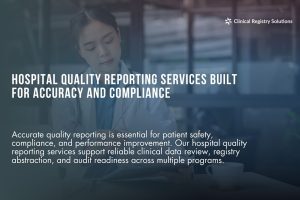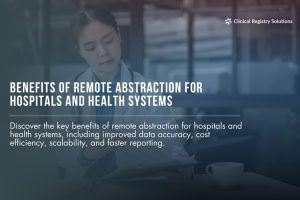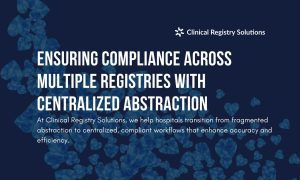In today’s data-driven healthcare environment, clinical data abstraction plays a pivotal role in enhancing patient outcomes, ensuring regulatory compliance, and enabling participation in clinical registries. However, the complexity of extracting, interpreting, and submitting accurate clinical data requires specialized training for data abstractors.
This article explores why clinical data abstraction training matters, outlines the core skills abstractors need, and offers guidance on implementing effective training programs within healthcare organizations.
Why Is Clinical Data Abstraction Training Important?
The accuracy and reliability of data abstraction directly influence healthcare decision-making, regulatory compliance, and performance benchmarking. Proper training ensures that data abstractors:
- Understand Regulatory Requirements: Healthcare organizations must comply with strict reporting guidelines from bodies like the Centers for Medicare & Medicaid Services (CMS) and registries such as the ACC NCDR.
- Minimize Errors: Inaccurate data abstraction can result in flawed reporting, regulatory penalties, and missed opportunities for quality improvement.
- Enhance Patient Outcomes: By accurately capturing clinical data, abstractors help identify care gaps that inform evidence-based interventions.
- Optimize Workflow Efficiency: Skilled abstractors streamline processes, reducing the administrative burden on clinical staff and ensuring timely data submissions.
Core Skills for Clinical Data Abstractors
Clinical data abstractors require a diverse and specialized skill set, including:
- Medical Knowledge
Proficiency in medical terminology, diagnoses, procedures, and treatments, along with familiarity with coding systems such as ICD-10 and CPT. - Attention to Detail
The ability to meticulously review medical records and documentation to ensure completeness and precision. - Analytical Thinking
Capability to interpret complex clinical data and apply abstraction guidelines accurately. - Technological Proficiency
Competence in using electronic health record (EHR) systems, registry platforms, and data management software. - Communication Skills
Effective collaboration with clinicians, administrators, and registry coordinators to align on data requirements and objectives.
Components of a Comprehensive Clinical Data Abstraction Training Program
To empower abstractors, training programs should cover:
- Introduction to Data Abstraction
Overview of the role and its impact on healthcare outcomes. - Regulatory Guidelines and Standards
Instruction on CMS requirements and registry-specific protocols (e.g., ACC NCDR, STS). - Medical Record Navigation
Hands-on training in accessing and interpreting EHR systems. - Abstraction Rules and Protocols
Detailed guidance using case scenarios for different registries and quality measures. - Data Quality and Validation
Techniques for ensuring accuracy, consistency, and completeness of data submissions. - Use of Abstraction Tools
Training on software for data submission, reporting, and performance analytics. - Ethics and Confidentiality
Emphasis on HIPAA compliance and safeguarding patient information. - Ongoing Education
Continuous learning opportunities to keep abreast of evolving guidelines and technologies.
Best Practices for Implementing Training Programs
Healthcare organizations can maximize training success by:
- Customizing Content
Tailor training to organizational priorities, registries, and reporting requirements. - Incorporating Real-World Scenarios
Use practical exercises and case studies to build hands-on expertise. - Engaging Experts
Involve experienced abstractors and clinicians as trainers and mentors. - Leveraging Technology
Utilize online modules, webinars, and simulations for accessibility and engagement. - Monitoring Progress
Use quizzes, practical tests, and audits to assess competency and compliance. - Encouraging Collaboration
Foster a supportive environment for knowledge-sharing among abstractors.
The Role of Certification in Clinical Data Abstraction
Certifications serve as a benchmark of professional competence and can include:
- Certified Health Data Analyst (CHDA)
- Certified Coding Specialist (CCS)
- Registry-specific certifications
Encouraging certification elevates abstractor expertise and enhances organizational credibility.
Outsourcing vs. In-House Training
Healthcare organizations must decide between:
- In-House Training:
Offers control over content and builds internal expertise for long-term sustainability. - Outsourcing:
Provides immediate access to skilled professionals, reduces internal resource demands, and speeds compliance.
Many organizations adopt a hybrid approach, combining in-house training with outsourced services for specialized or high-volume needs.
Final Thoughts
Clinical data abstraction training is a strategic investment that drives data accuracy, regulatory compliance, and improved patient care. Equipping abstractors with essential skills transforms data abstraction from a routine task into a powerful asset that supports healthcare quality improvement.
Whether building an in-house team or partnering with external experts, prioritizing training ensures your organization remains at the forefront of healthcare excellence.
